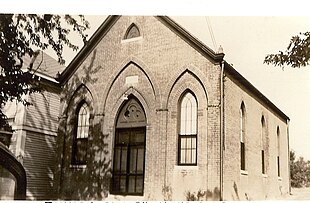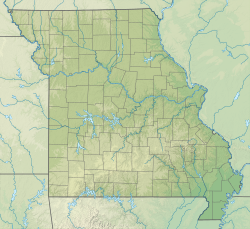Temple Beth El (Jefferson City, Missouri)
In this article, the topic of Temple Beth El (Jefferson City, Missouri) will be addressed exhaustively, analyzing its main aspects and addressing the different perspectives that exist on the matter. Temple Beth El (Jefferson City, Missouri) is a topic that has generated great interest both in the academic community and in society in general, due to its relevance and impact in various areas. Throughout these pages, Temple Beth El (Jefferson City, Missouri) will be examined from different approaches, with the aim of providing a comprehensive and enriching vision on this topic. By reviewing various sources and presenting specific cases, the reader will be provided with a broad understanding of Temple Beth El (Jefferson City, Missouri) and its implications today.
| Temple Beth El | |
|---|---|
 Temple Beth El, c. 1920 | |
| Religion | |
| Affiliation | Reform Judaism |
| Ecclesiastical or organisational status | Synagogue |
| Status | Active |
| Location | |
| Location | 318 Monroe Street, in Jefferson City, Missouri |
| Country | United States |
Location in Missouri | |
| Geographic coordinates | 38°34′28″N 92°10′15″W / 38.57458°N 92.17086°W |
| Architecture | |
| Architect(s) | Frank B. Miller |
| Type | Synagogue |
| Style | Gothic Revival |
| Date established | c. 1876 (as a congregation) |
| Completed | 1883 |
| Website | |
| templebethel-jc | |
Temple Beth El is a Reform Jewish synagogue located at 318 Monroe Street, in Jefferson City, Missouri, in the United States. Built in 1883 it has been in continuous use at that location since its construction. Shabbat services are led by members of the congregation every Friday night, and holiday services are also observed. The congregation is affiliated with Union for Reform Judaism. Temple Beth El is the oldest synagogue building in use west of the Mississippi.
History
The Jewish congregation of Jefferson City built for themselves a synagogue on the west side of Monroe Street between High and McCarty in 1883. The building is 38 by 25 feet (11.6 m × 7.6 m) and constructed of brick and cut stone trimmings. The interior is neatly furnished and includes a Torah scroll handwritten on parchment. The original Torah written in 1811 is still in use today. The Temple was designed by prominent local architect, Frank B. Miller, who also designed the Cole County Courthouse and Central Missouri Trust Company. A plaque was placed in the building by the 12 founders in appreciation of women in the Hebrew Ladies Sewing Society who "by untiring exertion and labor have secured and presented to the congregation a house and a lot dedicated to the service of the most high." The wording on the plaque is noteworthy because the women are listed by their first names, which was unusual for the time.
Most of the early members of the congregation were merchants with stores on High Street selling clothing, shoes, and saddles including the Globe Shoe and Clothing Store, Straus Saddlery, Goldman Clothing Store, The Reliable Store, Czarlinsky's and later Herman's Department Store and Leeds.
On September 19, 1954, Temple Beth El hosted Missouri's ceremonies during the tercentenary of the first Jewish settlement in North America. Governor Phil Donnelly signed a proclamation recognizing the event in October 1957.
Temple Beth El is located within the downtown Missouri State Capitol Historic District.
Gallery
-
Temple Beth El
-
Original plaque listing founding members of Temple Beth El
See also
References
- ^ "Union for Reform Judaism Congregation Profile". June 24, 2016.
- ^ Caplan, Lois (December 12, 2008). "Jefferson City congregation celebrates major milestone". St. Louis Jewish Light.
- ^ a b c d "Temple Beth El, Jefferson City, MO - History". www.templebethel-jc.org. Retrieved June 24, 2016.
- ^ Gordon, Mark W. (1986). "Rediscovering Jewish Infrastructure: The Legacy of U.S. 19th Century Synagogues". American Jewish History. 75 (3): 296–306. ISSN 0164-0178.
- ^ "No title". Jefferson City Daily Tribune. October 14, 1883.
- ^ a b Kremer, Gary (2004). Heartland History. Vol. 3. City of Jefferson. pp. 68–70. ISBN 0-9744697-1-8.
- ^ Ohman, Marian (August 1980). "Cole County Courthouse".


